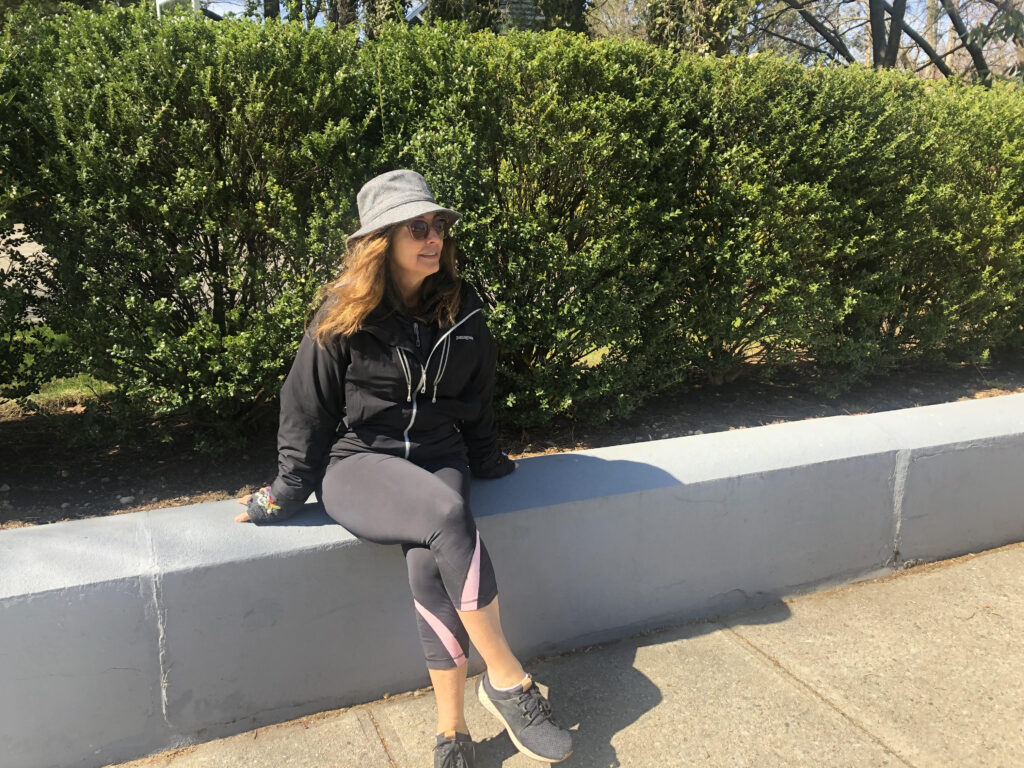Thank you for this guest post Tracy Teicher Nathanson, LCSW, MA an avid runner and longtime practicing psychotherapist, is the founder of Pace of Mind Therapy. She combined her two passions to create an innovative therapy practice that offers walk and talk or run and talk psychotherapy outside. Tracy is a Scarsdale mom of two and a licensed psychotherapist specializing in the treatment of anxiety, depression, relationship issues, life transitions, low self-esteem, career challenges and stress management. Her goal is to provide a fresh way to engage in talk therapy by literally taking patients off the couch or out of the office and into the fresh air.
Many of us are now starting our days looking at our phones, scrolling through social media or watching the news for the latest COVID-19 updates. How does that make you feel? I bet not very good. During a facetime therapy session today, a patient of mine expressed a belief that keeping informed is the responsible thing to do. So, as a result, this patient spends most of the day consuming news that he finds anxiety-producing and then is unable to do other things that he acknowledges would be better for him. My patient is not alone.
Many of us are struggling with our new reality and cling to the news everyday hoping it will bring more certainty into our lives. Instead, everyday seems to bring more questions and more concerns. However, while we cannot control our external world, we can exert control over our internal world. Emotional self-care has never been more important. Here are some ways to achieve a sense of calmness and reduce anxiety in this new landscape.
- Limit exposure to media. While this may seem logical, it is surprising how
many people are unable to extricate themselves from the 24-hour news cycle. Yes, we are looking for answers, an end date to the turmoil. We all have different tipping points in terms of how much news we can manage without starting to feeling highly anxious and stressed. Personally, I have limited my intake quite a bit. I am watching the nightly news at 6:30pm every night with my family. We watch together and process it with each other. It feels much better than consuming the news alone – morning to night.
- Get outside and get moving. As a psychotherapist who specializes in walk
and talk therapy sessions outside with patients, I know firsthand the myriad healing powers of being active in nature. Walk alone, walk with a friend (six feet apart) or walk with a psychotherapist. As you move, your body produces endorphins, the “good” feeling neurochemicals.
- Connect with friends, family and others. Being stuck at home can lead to
feelings of loneliness and isolation. The best way to combat this is to keep connected to others. If you are still struggling, know that you are not alone. Many are feeling heightened anxiety, sadness, and other challenging
emotions. It is important to remember that there is a normal period of adjustment with any major change, and for some it might take longer to adjust to this currently limiting lifestyle. However, please note if you are struggling and having excessive worries, consider seeking out a therapist. Psychology Today and Good Therapy are some online resources that provides listings for mental health professionals in the Unites States. I, along with countless other psychotherapists and social workers, have been doing phone and video sessions since social distancing mandates went into effect and will continue to do them as long as necessary.
- Create structure in your day. Routine is so important and helps us feel safe
and grounded. Our work life, activities and more have all been disrupted. Where to begin? Start small and start adding to your day. Gain insight into what activities and projects help you feel good during the day and which ones don’t. If you are working from home, recognize that this is an adjustment and try to be patient and kind to yourself.
- Consider mindfulness-based activities. There has never been a better time to introduce this into your life. Mindfulness is a type of meditation that grounds you to the present, to your body and to your senses. It involves breathing exercises, visual imagery and other activities to bring you a sense of calm and relax your mind and body. There are plenty of yoga and meditation classes now on demand
It has never been more important to take care of your emotional health. With that in mind, Thich Nhat Hanh, the famous Zen teacher, has a beautiful meditation on walking and mindfulness that truly resonates with me at this moment. He says, “The mind can go in a thousand directions. But on this beautiful path, I walk in peace. With each step, a flower blooms.”

